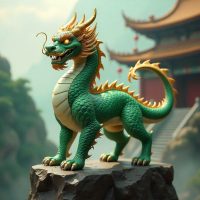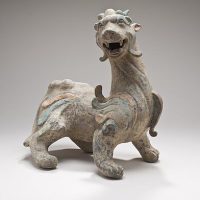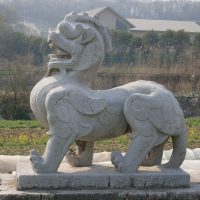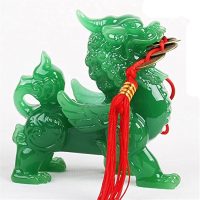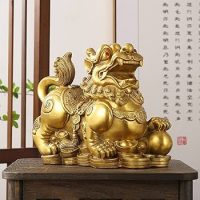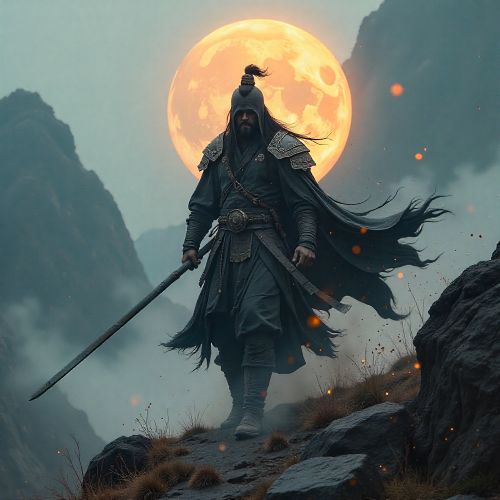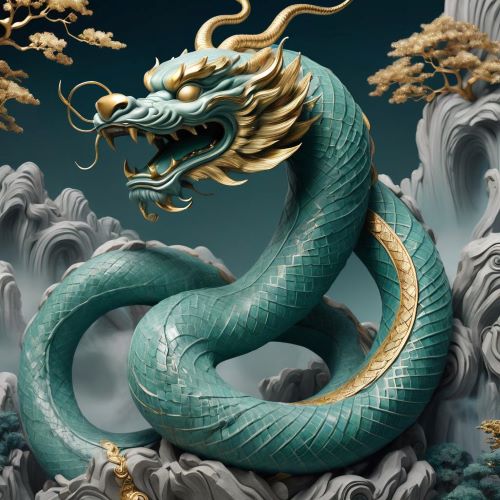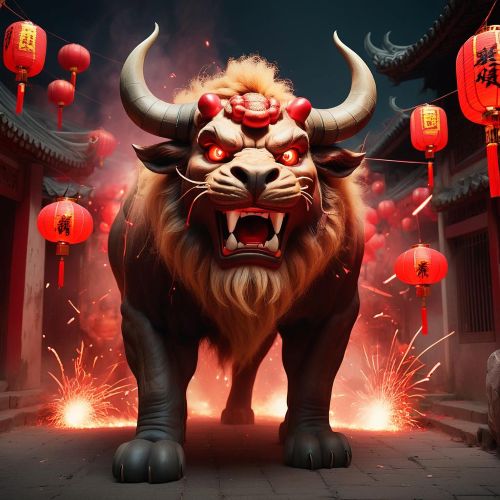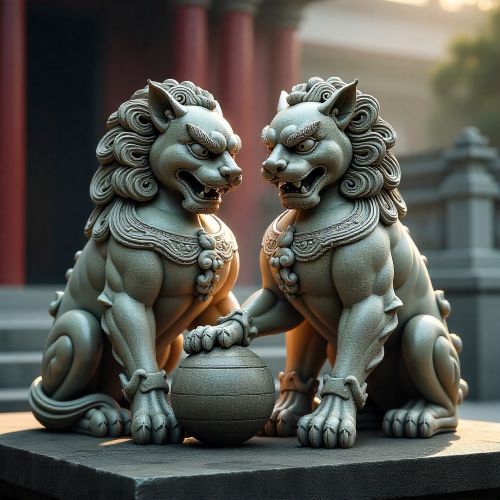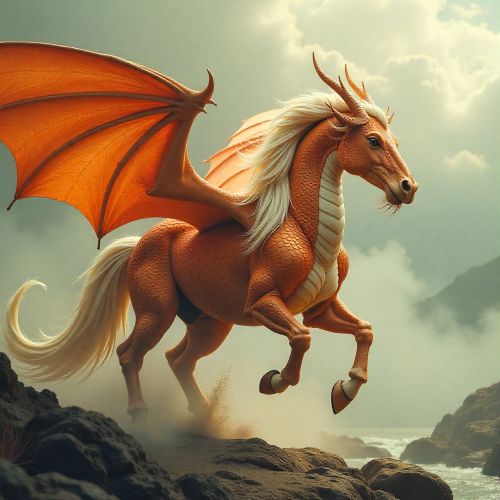Pixiu : The Chinese Mythical Guardian of Wealth and Protection
Listen
At a glance
| Description | |
|---|---|
| Origin | Chinese Mythology |
| Classification | Hybrids |
| Family Members | Dragon King (Father) |
| Region | China |
| Associated With | Wealth, Protection |
Pixiu
Introduction
Pixiu, also spelled Pi Yao, is one of the most iconic mythical creatures in Chinese mythology and feng shui traditions. Often described as a celestial guardian with a fierce appetite for wealth, Pixiu is revered across centuries for its power to attract prosperity and protect against misfortune. Ancient texts connect it to the Dragon King’s lineage, anchoring its reputation as a divine enforcer of abundance and security. From imperial courts to modern business owners, Pixiu continues to symbolize good fortune, strong protection, and the unbreakable flow of wealth.
Physical Traits
Pixiu is recognized for its striking, imposing form that blends the features of several sacred animals into one powerful guardian. Its dragon-like head symbolizes heavenly authority, while its lion-like muscular body suggests dominance and courage. Many depictions show Pixiu with wings, allowing it to move freely between realms, reinforcing its role as a celestial envoy. A curled tail, sharp fangs, protruding eyes, and a fierce forward-facing posture all contribute to its protective aura.
One of the most distinctive mythological traits of Pixiu is its sealed rear end, a feature believed to allow it to consume wealth—gold, jewels, and treasures—without ever losing any. This single characteristic has become the cornerstone of its association with wealth retention in feng shui. Pixiu also appears in two main forms: the male Tianlu, often portrayed with one horn and associated with drawing wealth, and the female Bixie, typically with two horns and renowned for driving away evil and harmful forces.
Family
Pixiu’s mythological prestige is closely tied to its origin as one of the nine sons of the Dragon King, the celestial ruler of water, storms, and cosmic order. This lineage places Pixiu among the highest ranks of divine beasts and affirms its role as a natural guardian of heaven’s treasures. Myths describe Pixiu as a loyal and powerful creature entrusted with the responsibility of safeguarding heavenly wealth and maintaining order among spiritual beings.
Some stories explain Pixiu’s sealed rear as a consequence of mischief in the heavenly palace, after which the Jade Emperor decreed that it would forever retain whatever wealth it consumed. Regardless of the version, its dragon ancestry reinforces its authority, auspicious status, and ability to act as a bridge between heaven and earth.
Other names
Throughout history, Pixiu has been known by several names that reveal layers of cultural interpretation. In many southern Chinese dialects, it is referred to simply as Pi Yao, emphasizing its guardian qualities. Earlier translations and East Asian adaptations refer to it as Bixie, meaning “to ward off evil,” highlighting its role as a protector against negative forces.
Some traditions differentiate between Tianlu—associated with accumulating wealth—and Bixie—associated with repelling harm and misfortune. While these names vary by region and interpretation, they all share a consistent reverence for Pixiu’s dual nature as both a wealth magnet and a powerful spiritual guardian.
Powers and Abilities
The legendary abilities of Pixiu form the foundation of its continued popularity. Foremost among its powers is the capacity to attract wealth from all directions. In feng shui, Pixiu is believed to draw prosperity toward the household or business it guards, ensuring a continuous and increasing flow of good fortune. Its sealed rear represents perfect financial retention—a symbolic assurance that wealth will not leak away.
Pixiu is also famed for its fierce protective nature. Its formidable appearance is believed to ward off evil spirits, prevent negative energy from entering a space, and shield individuals from harm or financial downturns. Many practitioners place Pixiu near entrances, cash registers, or personal workspaces to enhance its protective influence.
Legends also attribute loyalty and spiritual sensitivity to Pixiu. It is said to bond with its owner, offering steadfast protection, courage, and resilience during times of difficulty. As a celestial creature, it is believed to respond to sincere intentions, making it a favored talisman for those seeking security and long-term financial growth.
Modern Day Influence
Pixiu’s influence has not diminished with time; instead, it has expanded into modern lifestyles and global cultural practices. In contemporary feng shui, Pixiu statues, bracelets, and pendants remain essential tools for attracting abundance and warding off financial instability. Business owners often display Pixiu figurines to invite profitable opportunities, while individuals wear Pixiu charms for good luck and personal safety.
Beyond traditional uses, Pixiu has also gained traction in fashion, jewelry, digital art, and global pop culture. Its fierce yet auspicious design appeals to collectors and spiritual practitioners alike. The rise of gemstone Pixiu bracelets in East and Southeast Asia reflects growing interest in combining ancient symbolism with modern aesthetics.
In architecture, temples, hotels, and government buildings continue to feature Pixiu sculptures at entrances to preserve harmony and repel harmful forces. Additionally, Pixiu frequently appears in modern media—video games, fantasy novels, animation, and decorative art—where it is reimagined as a powerful guardian creature with celestial or draconic attributes. Through these evolving adaptations, Pixiu maintains a living presence, bridging mythology with contemporary belief systems centered on prosperity, protection, and spiritual well-being.
Related Images
Source
Buddha3Bodhi. (2025, April 22). What is Pixiu in Chinese Culture? https://buddha3bodhi.com/blogs/news/what-is-pixiu-in-chinese-culture
Chinese 5 Elements. (2025, January 13). PiXiu – Chinese 5 Elements. https://chinese5elements.com/pixiu/
Taikong Sky. Pi Xiu-the ninth son of the Dragon King. https://www.taikongsky.com/blogs/legend-1/pi-xiu-the-ninth-son-of-the-dragon-king
KarmaBless. (2024, December 17). The Legend of PiXiu. https://karmabless.com/blogs/guide/the-legend-of-pixiu
KarmaBless. (2025, January 22). The Meaning and Power of Pixiu in 2025. https://karmabless.com/blogs/guide/the-meaning-and-power-of-pixiu-in-2025
KarmaBless. (2025, April 17). Pixiu – From Battle Mascot to Wealth Symbol. https://karmabless.com/blogs/guide/how-did-pixiu-transition-from-battle-mascot-to-modern-wealth-symbol
KarmaBless. (2024, September 29). What is Pixiu: The Ancient Guardian of Wealth. https://karmabless.com/blogs/guide/what-is-pixiu
Feng Shui Bracelets. (2025, January 4). Male and Female Pixiu: How To Distinguish Them? https://fengshuibracelets.com/male-and-female-pixiu/
Frequently Asked Questions
What is Pixiu and why is it considered a wealth symbol?
Pixiu is a mythical beast from Chinese lore believed to attract and retain wealth due to its ability to consume treasures without expelling them. This symbolism makes it a favored charm for financial luck
How does Pixiu help in feng shui practices?
In feng shui, Pixiu is placed in strategic locations to draw prosperity and block negative energy. It is commonly used in homes and businesses to promote financial growth and protection.
What is the difference between Tianlu and Bixie Pixiu?
Tianlu is the male Pixiu associated with accumulating wealth, while Bixie is the female Pixiu focused on warding off evil spirits. Together, they balance protection and prosperity.
How should Pixiu bracelets be worn for good luck?
Pixiu bracelets are typically worn on the left hand, symbolizing receiving wealth rather than giving it away. The Pixiu head should face outward to “hunt” for fortune.
Is Pixiu safe for everyone to wear or display?
Most traditions consider Pixiu suitable for adults seeking prosperity and protection. However, elderly individuals and pregnant women are sometimes advised to avoid Pixiu charms based on regional folk beliefs.


